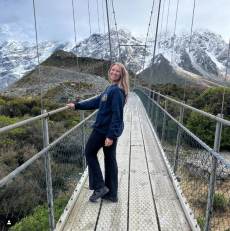
Costa Rica: Winter Field Study
ENV 353F: Costa Rica - National Parks and Protected Areas
Costa Rica is a world leader in both biological diversity and sustainable development. Indeed, the conservation and promotion of this biological diversity is a key element in Costa Rica’s model of sustainable development. Through this field study we'll view firsthand the differing habitats and management strategies associated with the wide variety of protected areas in Costa Rica. The areas visited will include national parks, national wildlife refuges, large and small private preserves, and biological corridors. Each has a role to play in protecting the natural resources necessary for sustainable development. Itinerary Highlights: Monteverde Cloud Forest Reserve, Santa Elena Reserve, Tenorio Volcano National Park, Arenal National Park, La Selva Biological Station, Tirimbina Biological Reserve, Poas Volcano National Park, 3 species of monkeys, 2 species of sloths, anteaters, and 900 species of birds.
Program Details
- Program Leader: Barry Allen
- Program Location: Costa Rica
- Tentative Travel Dates: Winter Break, 2025/26
- Credit: 2 – Credit/No Credit
- Prerequisites: ENV 353 (Fall semester 2025)
- Course Requirements: 15-page field report and active participation
- Anticipated Number of Students: 12
- Estimated Program Fee: $2,950
- Program Fee Includes: Roundtrip airfare from Orlando International Airport (MCO), tuition, housing, all meals, on-site activities, on-site transportation, program administration, and emergency insurance.
- Visa: Not required for U.S. citizens
- Special Notifications: Consumption of alcohol is not permitted on this field study. This program includes travel to some locations with more limited medical services. Students should be prepared for substantial walking on uneven ground, and some more strenuous hiking. Optional water activities. There will also be on-site travel that could induce motion sickness and areas with high altitude and heights. There will also be limited food options for students with restricted diets and allergies and limited food options in general. Some areas will not have air conditioning. Please contact IP for more information.
- Please Note: All dates are tentative and subject to change depending on the final number of students, final costs and other considerations.
- Please Note: Estimated costs for all programs are based on anticipated numbers of students, current exchange rates, and commercial airfares. Costs are subject to change. Final prices will always be communicated to accepted students before they commit to the program.

Explore Programs - Via TRM
Ready to see the world? Click below to access Via TRM - our official study abroad platform, to learn more and apply!
Access ViaTRM
